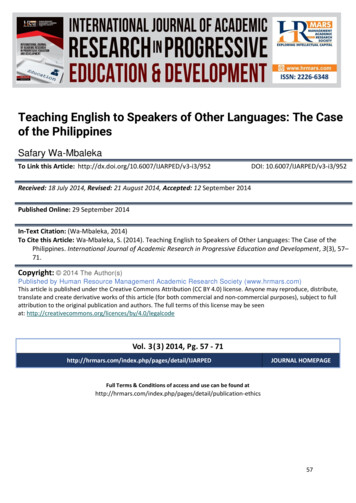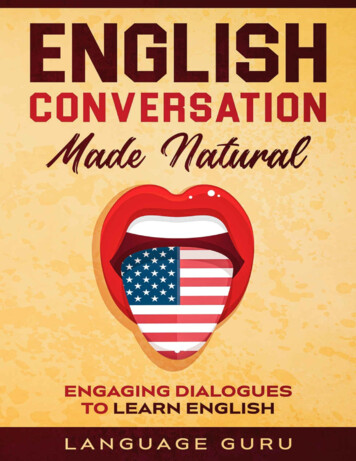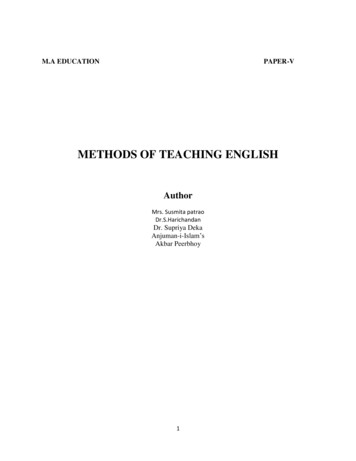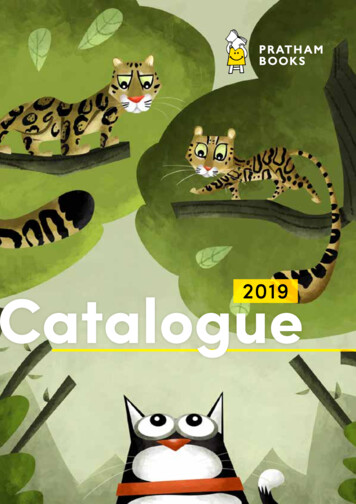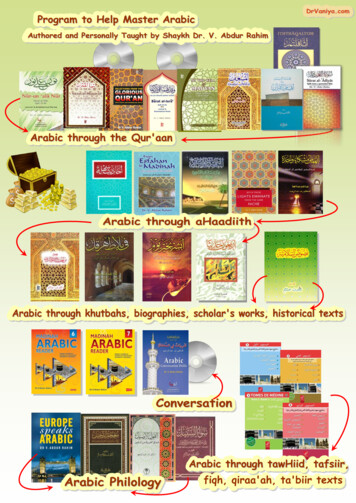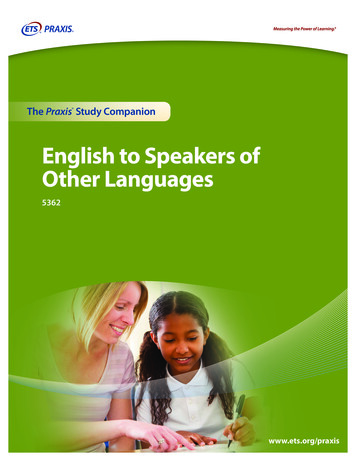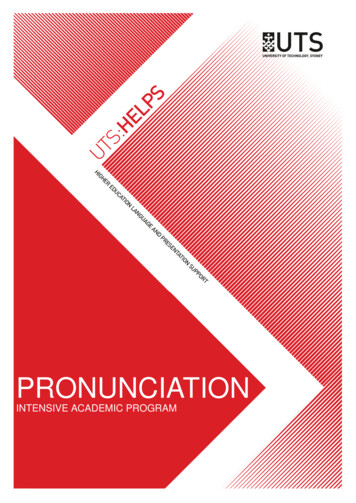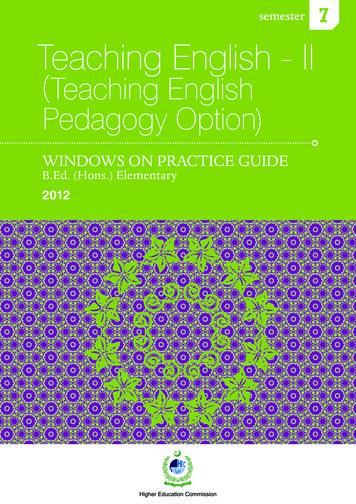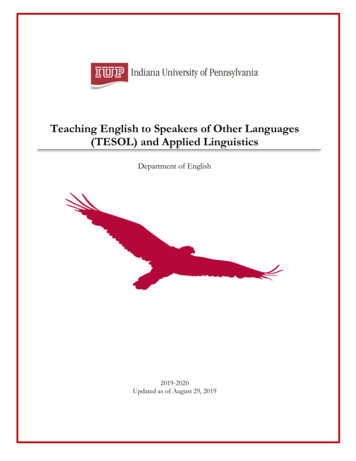
Transcription
Teaching English to Speakers of Other Languages(TESOL) and Applied LinguisticsDepartment of English2019-2020Updated as of August 29, 2019
MA TESOL Indiana University of PennsylvaniaTeaching English to Speakers of Other Languages(TESOL) and Applied LinguisticsDepartment of EnglishGraduate Studies OfficeHumanities and Social Sciences Building981 Grant StreetIndiana University of PennsylvaniaIndiana, PA 15705 USAOffice Phone: 724-357-2262Fax: 724-357-3056Program Website: http://www.iup.edu/english/grad/tesol-ma/ii
MA TESOL Indiana University of PennsylvaniaTABLE OF CONTENTSWelcome . 5Indiana Community and Beyond . 5The University. 6Statement Against Discriminatory Practices/IUP Civility Statement . 7Students . 8Faculty . 8Admission . 15MA TESOL Admission Requirements . 15Financial Assistance . 16Academic Advisement . 17Campus Resources & Student Support . 17IUP Email . 17Graduate Student Assembly . 17Degree and Program Requirements . 18Transfer Credit Policy . 19Course Descriptions . 19MA TESOL Thesis . 21Grievances . 25Some Readings for Incoming Students . 26University Policy and Procedure (See Graduate Catalog www.iup.edu/graduatestudies/catalog/). 27Academic Calendar. 27Academic Grade Appeal Policy. 27Academic Integrity . 27Academic Status and Satisfactory Academic Progress . 27Affirmative Action . 27Bereavement-Related Class Absences . 27Continuous Graduate Registration for Dissertation and Thesis . 27Graduate Fresh Start Policy .29Graduation Graduate Residency Requirement Policy .30Program Level Exams Appeal Policy . 30Reexamination Policy: Candidacy/Comprehensive Examination .31Registration. 31Social Equity. 31Student Conduct . 31Time Limitation . 32iii
MA TESOL Indiana University of PennsylvaniaTime-to-Degree Masters/Doctoral Dismissal Appeal Policy . 32Title IX Reporting Requirement . 32Transfer of Credits . 32Research . 33School of Graduate Studies and Research . 33Doctoral and Masters Student Travel to Present Papers. 33Graduate Student Research Grants . 33Graduate Student Professional Development Fund . 34Outstanding Graduate Student Researchers . 34Department/Program Awards . 34Student Rights and Responsibilities . 34Signature Page . 3iv
MA TESOL Indiana University of PennsylvaniaWelcomeThe M.A. in TESOL and Applied Linguistics welcomes prospective professionals in the areas ofTESOL (Teaching English to Speakers of Other Languages) and Applied Linguistics from the US andabroad. The program is designed to enrich students’ understanding of praxis in TESOL and AppliedLinguistics with particular foci in the areas of teaching English as a global language, teachingmethodological approaches focused on English as an international language, second language acquisition,critical pedagogy, materials and curriculum development in worldwide contexts, cross-cultural andmulticultural communication and pedagogy, critical and democratic assessment, observation of teachingas a professional endeavor, practicum experience, and research methods in TESOL and AppliedLinguistics.The Program has a rich history of over thirty years of academic excellence and professionalaccomplishments. It has awarded degrees to students from over forty countries. Its students and alumnihave held leadership positions in TESOL and Applied Linguistics programs worldwide. Many have goneon to pursue doctoral degrees in institutions both domestically and globally. Others have becomedistinguished teachers, curriculum and materials designers, and program directors around the world.The MA TESOL and Applied Linguistic Faculty includes professionals with establishedacademic, publication, and leadership records as well as with significant TESOL and Applied Linguisticsexperience. We serve as role models who provide expert professional guidance to our students. Many ofus have held leadership positions in TESOL, AAAL, AERA, and other professional organizations. Weare also among the founders and greatest supporters of our local Three Rivers TESOL Organization.For more information on faculty teaching and research areas of focus, please visit the faculty websites atwww.iup.edu/English.With its significant historical and current accomplishments, with its diverse and highly motivatedstudent body, and with its dedicated and distinguished faculty, the MA TESOL and Applied Linguisticsprogram provides a friendly atmosphere of intellectual creativity and teacher-student collaboration thatfoster career and professional excellence.The Indiana Community and BeyondIUP is located in Indiana, Pennsylvania, 55 miles northeast of Pittsburgh, in the foothills of the beautifulAllegheny Mountains. Therefore, it offers much of the best of both small town and city life. With apopulation of about 35,000, Indiana and its neighboring small towns are quiet and picturesque, withseveral nearby natural areas and state parks that provide opportunities for hiking, camping, boating, andfishing. The Indiana area is rich in culture from its history of mining to its most famous son, Hollywoodfilm legend Jimmy Stewart. The local economy is based primarily on energy resources, health care,education, finance, and other service industries.Although it is a small town, Indiana has many places to explore off campus. Indiana’s bustlingPhiladelphia Street has many restaurants, including Tandoor Indian Cuisine, H.B. Culpeppers, Cozumel5
MA TESOL Indiana University of PennsylvaniaMexican Restaurant, Hookah Bookah and The Coney. Along with these great restaurants, Indiana alsohas a mall, a movie theater, and other small shops.There are other attractions near Indiana, PA as well, such as Frank Lloyd Wright’s world-famousFallingwater, which is a 90-minute car trip from IUP, near some of the best whitewater rafting in theregion. Nearby Pittsburgh offers students opportunities to enjoy all that a large, rejuvenated Americancity has to offer. From the Strip District, with its bustling, open-air warehouse food markets; to theBohemian coffee shops; to the fine and ethnic restaurants; to the internationally known art museums,including the Carnegie Museum and the Andy Warhol Museum; to the John Heinz Museum of RegionalHistory; to the music of the Pittsburgh Symphony and the jazz and small rock and roll clubs; to thecollegiate and national sports teams--the Pittsburgh Steelers, Pirates, and Penguins; Pittsburgh is acosmopolitan city that has not lost its multicultural and working class, ethnic heritage.The UniversityIndiana University of Pennsylvania has a history rich in accomplishments. Since 1875, when IUP servedonly 225 students in a single building, the institution has grown to be Pennsylvania's fifth largestuniversity. IUP comprises seven colleges and two schools and offers thirteen degree programs throughthe doctoral program. IUP, which was granted university status in 1965, has been nationally acclaimed asamong the academic best. In October, 1985, Edward Fiske, education editor of the New York Times,included IUP as one of 221 "Best Buy" colleges and universities in the nation in his highly acclaimedpublication, The Best Buys in College Education. Only twelve Pennsylvania schools were chosen. It was alsoone of five universities chosen for the “Best Values in Public Colleges” list by Kiplinger’s PersonalFinance magazine. In 2006 the university was awarded accolades for its “exemplary comprehensive selfstudy” and “outstanding faculty, student services and information technology” by the Middle StatesCommission on Higher Education.The IUP campus hosts more than 200 cultural and entertainment events each year. For example, eachsummer IUP hosts the Indiana community’s Picnics in the Grove, and each spring semester the Officeof International Education hosts International Unity Day. IUP also provides students with manyopportunities for internships and studying abroad. Its internship program, the largest in Pennsylvania,offers students on-the-job experience as well as classroom learning. The university also provides manyresearch resources. The IUP Stapleton Library is one example of this, holding more than 850,000volumes and many scholarly journals, many of which pertain to composition, TESOL, and Americanliterature.IUP is 55 miles northeast of Pittsburgh in the foothills of the beautiful Allegheny Mountains. Thisprovides easy access to other resource centers like Carnegie Mellon University’s Hunt Library inPittsburgh as well as the Library of Congress, which is only several hours away in Washington, D.C.6
MA TESOL Indiana University of PennsylvaniaStatement Against Discriminatory PracticesThe Indiana University of Pennsylvania Master’s in TESOL program is committed to promoting equalopportunity and does not tolerate discriminatory practices of employers. As such, the program does notcondone applying to positions which explicitly exclude hiring non-native English speaking teachers.Therefore, students in our graduate certificate program will not be encouraged to apply for any positionswith such discriminatory qualifications. It is our hope that all students of the Master’s in TESOLprograms will continue to consider and combat the discriminatory native versus non-native Englishspeaking teacher dichotomy as they pursue positions in the TESOL field.IUP’s Civility StatementAs a university of different peoples and perspectives, IUP aspires to promote the growth of all people intheir academic, professional, social, and personal lives. Students, faculty, and staff join together to createa community where people exchange ideas, listen to one another with consideration and respect, and arecommitted to fostering civility through university structures, policies, and procedures. We, as membersof the university, strive to achieve the following individual commitments:To strengthen the university for Academic Success, I will act honestly, take responsibility for mybehavior and continuous learning, and respect the freedom of others to express their views.To foster an environment for personal growth, I will honor and take care of my body, mind, andcharacter. I will be helpful to others and respect their rights. I will discourage intolerance, hatred, andinjustice, and promote constructive resolution of conflict.To contribute to the future, I will strive for the betterment of the community; myself, my university,the nation, and the world.StudentsMany of the students enrolled in our M.A. in TESOL and Applied Linguistics program, along with anequal number of alumni, hold teaching positions at academic institutions throughout the world. Thisdiverse student population creates opportunities to learn about composition, language, and literacy indifferent educational settings and cultures. At the end of the degree program, many of our studentsreturn to their home institutions as tenure-track faculty. Our graduates go on to publish, speak atconferences, and lead workshops.FacultyOur program’s faculty members are teacher–scholars. They teach undergraduate as well as masters anddoctoral courses. They have written books used in graduate programs and have been published byscholarly presses: Heinemann Boynton/Cook, Cambridge University Press, the National Council ofTeachers of English, Hampton Press, TESOL Publications, and the University of Michigan Press. Youwill find their names in journals such as College Composition and Communication, Computers and Composition,English Journal, English Teaching Forum, Journal of Adolescent and Adult Literacy, Journal of Reading, The Language7
MA TESOL Indiana University of PennsylvaniaTeacher, PRE/TEXT, Research in the Teaching of English, TESOL Journal, TESOL Quarterly, and The WritingInstructor. You will also see them at conferences, such as the American Association of AppliedLinguistics, the annual convention of the National Council of Teachers of English, the College LanguageAssociation, the Conference on College Composition and Communication, the Linguistics Society ofAmerica, the Three Rivers TESOL Conference, and the annual TESOL convention.Director: Gloria ParkM.A. in TESOL and Applied Linguistics Faculty:Dana Driscoll, David Hanauer, Gloria Park, Curtis Porter, Cristina Sanchez-Martin, and Lilia SavovaFaculty ProfilesDana Driscoll, Ph.D.Dana Driscoll’s research focuses primarily on two aspects: how people learn to write and transfer thatknowledge to a wide range of circumstances and how we can support research-based writing centerpractices.Her first research focus surrounds students’ long-term development as writers, their ability to use andadapt what they learn to new circumstances, and how we can better support that learning. Specifically,Dana examines how students develop as writers and “transfer” that knowledge from high school tocollege, course to course, or the university to workplace settings. This research has lead her to an interestin studying students’ dispositions, or individual qualities that help foster writing success, as well asstudents’ metacognitive awareness. She is part of the Writing Transfer Project, a multi-institutional teamof researchers supported by grants from the Spencer Foundation and the Conference on CollegeComposition and Communication. She is also currently undertaking a seven-year study of 13 studentwriters as they move through a variety of college writing tasks and into the workplace and beyond. Shehas published on writing transfer in a variety of venues including Composition Forum, Across theDisciplines,Teaching and Learning Inquiry, and Writing Program Administration as well as in several editedcollections.Dana’s second line of research draws upon her long-term work in writing centers and her passion forresearch methodology. This line of research seeks to support writing center practitioners (tutors anddirectors) in developing research that are replicable, aggregable, and data-supported (RAD). Her coauthored 2012 article “Theory, lore, and more: An analysis of RAD research in the Writing CenterJournal, 1980–2009” won the International Writing Center Association’s Outstanding Article award. Herwork on this topic has appeared in the Writing Center Journal, among other venues.In addition to Dana’s scholarly pursuits, she has also served the field in a variety of ways. She recentlycompleted a three-year term as a member of the CCCC Executive Committee; prior to this, she served athree-year term as the CCCC Connected Community editor. She is a founding editorial board member ofthe Writing Research, Pedagogy, and Policy series with Southern Illinois University Press and has served as afounding editorial board of the Peer Review, an IWCA journal dedicated to sponsoring new authors.8
MA TESOL Indiana University of PennsylvaniaAdditionally, she serves as an article reviewer for the Writing Center Journal, Writing ProgramAdministration, CCC, Present Tense, and Composition Forum.Dana is passionate about fostering student learning and in helping students build connections in theirlearning to real-world contexts. At her previous position as an associate professor at Oakland University,Dana won two teaching awards: the 2014 Excellence in Teaching award, given to one tenure-line facultymember a year, and a 2014 College of Arts and Sciences Teaching Engagement Award.Selected Publications:Driscoll, D. L., Gorzelsky, G., Wells, J., Hayes, C., & Salchak, S. (2017) Down the rabbit hole: Challenges andmethodological recommendations in researching writing-related student dispositions. CompositionForum 35.Driscoll, D. L. (2016). Ideals and realities in students’ literacy development: Writing Center/ELT collaborationsto support learning transfer. TESOL Arabia Perspectives, 24(3).Driscoll, D. L. and Powell, R. (2016). States, traits, and dispositions: The impact of emotion on writingdevelopment and writing transfer across college courses and beyond. Composition Forum (Special Issue onEmotions) 34.Driscoll, D. L. (2015) Building connections and transferring knowledge: The benefits of a peer tutoring coursebeyond the writing center. Writing Center Journal, 35(2).Allan, E., & Driscoll, D. L. (2014). Reflective writing in general education: Improving student learning,assessment, and faculty professional development. Assessing Writing, 21. 37-55.David Hanauer, Ph.D.David Ian Hanauer’s research employs arts-based, theoretical, qualitative and quantitative methods andfocuses on the connections among authentic literacies and social functions in first and second languages.As an applied linguist his research has investigated scientific discourse, assessment in the sciences, theprocesses of scientific inquiry, scientific writing in L1 and L2, the genre specific aspects of poetry readingin L1 and L2, graffiti research, cognitive aspects of literary education, cross-cultural understandings offable reading and academic literacy across disciplines. His articles have been published in Science, AppliedLinguistics, Discourse Processes, TESOL Quarterly, Canadian Modern Language Review, Research in the Teaching ofEnglish, Teaching and Teacher Education, Language Awareness, Cognitive Linguistics, Discourse Processes, The Arts inPsychotherapy, Poetics, and Poetics Today. He is the author of five books Scientific Discourse: Multiliteracy in theClassroom; Active Assessment: Assessing Scientific Inquiry; Poetry as Research: Exploring Second Language PoetryWriting; The Balanced Approach to Reading Instruction and Poetry and the Meaning of Life. Dr. Hanauer is therecipient of a National Science Foundation Grant for 2003-2005 for the study of science-literacyconnections in the elementary school classroom, several Howard Hughes Medical Institute grants from9
MA TESOL Indiana University of Pennsylvania2005-2011 for work on scientific inquiry, representation and assessment in the field of microbiology, anda 2009 grant from the US Department of Education for the enhancement of science reading collectionsin the Pittsburgh School District. Dr. Hanauer is a Professor of English at Indiana University ofPennsylvania and the Assessment Coordinator and educational researcher in the PHIRE (Phage HuntingIntegrating Research and Education) Program in the Hatfull Laboratory, Pittsburgh BacteriophageInstitute at the University of Pittsburgh. Dr. Hanauer is co-editor of the Language Studies, Science andEngineering book series with John Benjamins and associate editor of the journal Linguistics and Educationfrom Elsevier.Selected Publications:Hanauer, D. I. (2016). Beauty judgments of non-professional poetry: Regression analyses of authorial attribution,emotional response and perceived writing quality. Scientific Study of Literature, 5(2), 183-199.Hanauer, D. I. (2015). Measuring voice in poetry written by second language learners. Written Communication, 32(1),66-86.Hanauer, D. I. (2014). Being in the Second Iraq War: A poetic ethnography. Qualitative Inquiry, 21(1): 83-106.Hanauer, D. I. (2014). Appreciating the beauty of second language poetry writing. In D. Disney (ed.) ExploringSecond Language Creative Writing (pp. 11-22). Amsterdam: John Benjamins.Hanauer, D., & Englander, K. (2013). Scientific Writing in a Second Language. West Lafayette: Parlor PressHanauer, D., & Englander, K. (2011). Quantifying the burden of writing research articles in a second language:Data from Mexican scientists. Written Communication, 28(4) 403–416.Hanauer, D. (2011). The discursive construction of the separation wall at Abu Dis: Graffiti as political discourse.Journal of Language and Politics.Hanauer, D. (2011). The scientific study of poetic writing. The Scientific Study of Literature, 1(1), 79-87.Hanauer, D. (2010). Poetry as Research: Exploring Second Language Poetry Writing. Amsterdam: John Benjamins.Hanauer, D., Hatfull, G., & Jacobs-Sera, D. (2009). Active Assessment: Assessing Scientific Inquiry. New York: Springer.Gloria Park, Ph.D.Gloria Park completed her Ph.D. in 2006 with a dissertation entitled, “Unsilencing the Silenced: The Journeysof Five East Asian Women Teacher Candidates in US TESOL Programs” at the University of Maryland, CollegePark. Her dissertation work won the Promising Researcher Dissertation Fellowship (2004-2006) fromUniversity of Maryland, College of Education. Her publications have appeared in ELT Journal, Journal ofLanguage Identity and Education, TESOL Quarterly, TESOL Journal, Race, Ethnicity, and Education and TESOLPublication Series in Community College Teaching and Second Language Writing. She is currently serving on theEditorial Advisory Board of the TESOL Journal and serving as an associate editor for the International10
MA TESOL Indiana University of PennsylvaniaJournal of Innovation in English Language Teaching and Research. Her teaching and research interests focus onteachers’ narratives, qualitative research, classroom research, World Englishes scholarship, and criticalpedagogy issues in second language teacher education.Selected Publications:Tanghe, S., & Park, G. (2016). “Build[ing] something which alone we could not have done”: Internationalcollaborative teaching and learning in language teacher education. System: An International Journal ofEducational Technology and Applied Linguistics, 57, 1-13.Varghese, M., Motha, S., Park, G., Reeves, J., & Trent, J. (2016). Language teacher identity in (multi)lingualeducational contexts. Special Themed Issue for TESOL Quarterly.Widodo, H. J., & Park, G. (2014) (Edited). Moving TESOL beyond the Comfort Zone: Exploring Criticality in TESOL.New York: NOVA Science’s Language and Linguistics Series.Park, G., Rinke, C., & Mawhinney, L. (2016). Exploring the interplay of cultural capital, habitus, and field in thelife histories of two West African teacher candidates. Teacher Development: An International Journal of Teachers’Professional Development, 20(5).Park, G. (2015). Raising awareness of diversity and social (in)justice issues in undergraduate research writing:Understanding students and their lives via connecting teaching and research. Journal of PedagogicDevelopment, 5(1), 65-72.Park, G. (2015). Situating the discourses of privilege and marginalization in the lives of two East Asian womenteachers of English. Race, Ethnicity and Education, 18(1), 108-133.Park, G., & Henderson Lee, S. (2014). Critical perspectives on World Englishes: An inquiry into our disciplinaryspaces as teacher-scholars. Special Themed Issue for TESOL Journal, 5(3), 395-411.Park, G. (2013). My Autobiographical Poetic Rendition: An Inquiry into Humanizing our Teacher-Scholarship. L2Journal Special Themed Issue: L2 Writing and Personal History, 5(1), 6-18.Park, G. (2013). “Writing is a way of knowing” Writing and identity. ELT Journal, 63Park, G. (2013). Situating the discourses of privilege and marginalization in the lives of two East Asian womenteachers of English. Race, Ethnicity and Education.Park, G. (2012). “I am never afraid of being recognized as an NNES”: One woman teacher’s journey in claimingand embracing the NNES identity. TESOL Quarterly, 46(1), 127-151.Park, G. (2011). Adult English language learners constructing and sharing their stories and experiences: Thecultural and linguistic autobiography (CLA) writing project. TESOL Journal, 2(2), 156-172.Park, G., Widodo, H., & Cirocki, A. (Eds.). (2010). Observation of teaching: Bridging theory and practice in research onteaching. Berlin, Germany: Lincom Europa Publisher.11
MA TESOL Indiana University of PennsylvaniaCurtis Porter, Ph.D.Curt's areas of academic interest include language and literacy pedagogy, teacher education, educationalphilosophy, and curriculum theory. His research projects have investigated autobiographical writing inteacher development, the use of multimedia in language instruction, and connections between literacypractices, affect, and subjectivity. Recently he has explored the role of bodies and places in literacydevelopment in an effort to seek out applications for embodied literacies in classroom teaching andresearch. His work has appeared in TESOL Quarterly, TESOL Journal, English Teaching: Practice & Critique,TESL-EJ, Currere Exchange, and other journals, books, and reference materials. He currently serves onthe editorial board of the Korean Association of Media Assisted Language Learning Journal and STEM Journal.Selected Publications:Porter, C., & Park, G. (2017). Complementary and contradictory visions of epistemic justice in world EnglishesGraduate Seminars: A Dialog. In A.F. Selvi & N. Rudolph (Eds.), Contextualizing Education for GlocalInteraction - Issues and Implications. Springer.Porter, C. & Gallagher, C. (2017). Exploring Professional Uncertainty in Critical Language Teacher Education: ACollaborative Story of Political Transition. Currere Exchange, 1(1), 32-39.Porter, C. & Tanghe, S. (2016). Emplaced identities and the material classroom. TESOL Quarterly, 50(3).Craig, M., & Porter, C. (2014). “Speaking back” from the English periphery: Art-work in a South Korean highschool English classroom. English Teaching: Practice & Critique, 1
doctoral courses. They have written books used in graduate programs and have been published by scholarly presses: Heinemann Boynton/Cook, Cambridge University Press, the National Council of Teachers of English, Hampton Press, TESOL Publications, and the University of Michigan Press. You
